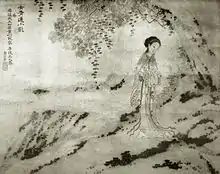Dong Xiaowan
Dong Xiaowan (1624–1651)[1] was a Chinese courtesan, poet and writer, also known by her pen name Qinglian.[2]
Dong Xiaowan | |
|---|---|
 Dong Xiaowan painted by Yu Zhiding after her death | |
| Native name | 董小宛 |
| Born | Dong Bai 董白 1624 Qinhuai District, Nanjing, Ming China |
| Died | December 1651 (aged 26–27) Qing China |
| Pen name | Qinglian 青蓮 Qinglian nüshi 青蓮女史 |
| Occupation | Courtesan, poet, writer |
| Language | Chinese |
| Nationality | Chinese |
| Partner | Mao Bijiang |
| Relatives | Lady Chen (mother) |
Dong has been described as the most famous courtesan of her time, known for her beauty and talent in singing, needlework and the tea ceremony.[2] She lived in the brothel district of Nanjing.[3] Similar to other courtesans of the late Ming Dynasty, Dong's moral qualities were emphasised among her admirers more than her talents.[4]
She is one of the Eight Beauties of Qinhuai (Chinese: 秦淮八艳) described by late Qing officials. The other famed courtesans of this group are Ma Xianglan, Bian Yujing (卞玉京), Li Xiangjun, Liu Rushi, Gu Mei, Kou Baimen (寇白門), and Chen Yuanyuan.[5]
Marriage
Dong's mother died in 1642, leaving her to struggle financially.[6] The noble Mao Bijiang (冒辟疆), alternatively known as Mao Xiang, had attempted to meet with Dong several times, but had pursued a relationship with the courtesan Chen Yuanyuan instead. After Chen was abducted by a noble associated with the imperial court, Mao visited Dong. Her mother had been dead for two weeks and Dong was quite ill. She proposed that she become his concubine and, refusing to take no for an answer, allegedly followed him for 27 days on his boat. Eventually, the two agreed to wait for Mao to pass the imperial examinations,[6] which he failed. In order to facilitate Dong's marriage, Qian Qianyi, husband of fellow courtesan Liu Rushi, paid off her debts of 3,000 gold taels and had her name struck from the musicians' register.[7] She then lived with Mao in Rugao as his concubine, alongside his wife Lady Su.[6]
She has been described as an ideal dutiful, sacrificing and loyal wife and daughter-in-law during her marriage to Mao Bijiang, who as a loyalist of the Ming dynasty was persecuted after the Qing dynasty's rise to power in 1644. When Mao, Lady Su and Dong were forced to flee their home in 1644, Dong abandoned her more valuable belongings to save her writings and paintings.[8] They stayed in Huzhou until Zhu Yousong was crowned emperor in Nanjing later in 1644. Soon after, the household moved to Zhejiang, where Dong compiled a book titled Liuyan ji (Chinese: 流宴集) about jewellery, women's costumes, pavilions and parties.[6]
Poetry
Dong wrote shi and was part of the new literati movement that focussed on emotions and the motif of the heartbroken lover. The poem below demonstrates a popular emotion, melancholy, focussing on a solitary woman in secluded female quarters.
Casual Composition by the Green Window [9]
I gaze at the flowers through ill eyes, steeped in melancholy thoughts,
Sitting alone by the secluded window, I play the jade-decorated zither.
The yellow orioles also seem to understand people's mind,
From beyond the willow they send out beautiful sounds time and again.Original Chinese text綠窗偶成
病眼看花愁思深,
幽窗獨坐撫瑤琴。
黃鸝亦似知人意,
柳外時時弄好音。
Legacy
After her death, Mao Bijiang published a biography of Dong's life . It was translated into English and published in 1931.[10] In it, he emphasised Dong's skill at needlework; a skill typically associated with the domestic virtues of a wife. In contrast, he downplayed her painting abilities, which Jean Wetzel has suggested may have been an attempt to disassociate Dong from her previous life as a courtesan.[11]
Dong has often been confused with Consort Donggo, and therefore said to have been abducted to the harem of the Emperor.
Dong's life was adapted for film by Cantonese opera playwright Tang Ti-sheng, with Fong Yim Fun portraying Dong.[12] Her romance with Mao Bijiang has been dramatised as a Kunqu opera by the Northern Kunqu Opera Theatre.[13]
References
Notes
- "56591: Dong Bai". Harvard University. Retrieved 15 February 2017.
- Chen (1998), p. 31.
- Gulik (1974), p. 291.
- Zurndorfer (2011), p. 211.
- Xie & Shi (2014), p. 181.
- Chen (1998), p. 32.
- Chen (1998), pp. 32–33.
- Wetzel (2002), p. 656.
- Berg (2013), p. 155.
- Mao (1931).
- Wetzel (2002), p. 650.
- "The Story of Tung Siu-Yen (1950)". Hong Kong Movie Database. Retrieved 15 February 2017.
- pp, ed. (13 February 2014). "董小宛故事搬上昆曲舞台 望打动年轻观众" [The story of Dong Xiaowan moves to the kunqu stage, hoping to move young audiences]. Sina.com (in Chinese). Retrieved 15 February 2015.
Works cited
- Berg, Daria (2013). Women and the Literary World in Early Modern China, 1580–1700. Oxon: Routledge. ISBN 978-0-203-11422-3.CS1 maint: ref=harv (link)
- Chen, Shengxi (1998). "Dong Xiaowan". In Lily Xiao Hong Lee; Clara Lau; A.D. Stefanowska (eds.). Biographical Dictionary of Chinese Women: Volume 1: The Qing Period, 1644 – 1911. Translated by S. M. Kwan. pp. 30–33. ISBN 9780765600431.CS1 maint: ref=harv (link)
- van Gulik, R. H. (1974). Sexual Life in Ancient China: A Preliminary Survey of Chinese Sex and Society from ca. 1500 B.C. till 1644 A.D. Leiden: Brill. ISBN 9789004039179.
- Mao, Hsiang (1931). The Reminiscences of Tung Hsiao-wan (in English and Chinese). Translated by Pan, Tze-yen. Shanghai: The Commercial Press.CS1 maint: ref=harv (link)
- Wetzel, Jean (2002). "Hidden connections: courtesans in the art world of the Ming Dynasty". Women's Studies. 31 (5): 645–669. doi:10.1080/00497870214051. S2CID 145231141.CS1 maint: ref=harv (link)
- Xie 谢, Yongfang 永芳; Shi 施, Qin 琴 (2014). "像传题咏与经典重构———以《秦淮八艳图咏》为中心" [Acclaim for portraits and classical reconstruction: 'Qinhuai bayan tuyong' as the centre]. Zhongguo Wenhua Yanjiu (2): 180–188.
- Zurndorfer, Harriet T. (2011). "Prostitutes and courtesans in the Confucian moral universe of Late Ming China (1550–1644)". International Review of Social History. 56: 197–216. doi:10.1017/S0020859011000411.CS1 maint: ref=harv (link)